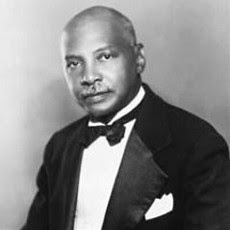|
|
| "Bloomin' Passion, helping yours inspire kids into happy adults" |
|
Mr. Handy's Blues Documentary Interview
William Christopher Handy,
known affectionately worldwide as
"The Father of the Blues."
 |
By Paul Cody
If You Love THE BLUES, JAZZ, MUSIC HISTORY, AFRICAN AMERICAN HISTORY, HARLEM RENAISSANCE, Will You Help Us Interview, Emmy Winner Joanne Fish, Producer, Director of
SCROLL DOWN FOR QUESTIONS FOR JOANNE FISH FROM Wily Bo Walker, British Blues Award Finalist 2016, " Jack Dappa" Pearley, Bluesman, and many others.
"Mr. Handy’s Blues" chronicles the life of William Christopher Handy, known affectionately worldwide asThe Father of the Blues. He was born seven years after the Civil War, and died at the dawn of the Space Age. Handy’s trajectory to success is an against all odds odyssey that took him from a strict religious home in Northern Alabama, to a low point of despair in St. Louis, Missouri to becoming one of the most revered composers of the 20th Century. His career started with a Minstrel Troupe during the Jim Crow days in the American South and catapulted him to ownership of a thriving music publishing office in New York City in 1918. Handy Brothers Music Company was the first African American owned entertainment enterprise on Broadway during that time.
"Mr. Handy’s Blues" is a tale of family conflict, racial tensions and redemption. The continuous thread is Handy’s vision, his love of music and his talent for transforming the oral traditions of his African American countrymen into a unique and commercial musical genre, namely the Blues. The narrator is W.C.Handy himself through the use of rare audio recordings and interviews.
Since the blues provided the building blocks for early jazz, it could be argued that Mr. Handy was also the father of modern American music. The great composerGeorge Gershwin credited W.C. Handy’s early blues songs as the foundational inspiration for Rhapsody in Blue.
Interviews with Taj Mahal {World Music Legend}, Bobby Rush {the "King of the Chitlin Circuit"} and Vince Giordano {Bandleader and Music Supervisor for Boardwalk Empire and Café Society} bring Handy’s story to life and illuminate the great accomplishments and contributions that Handy made through his universally known compositions and his determination to own his own materials.
"Mr. Handy’s Blues" features performances of Handy’s songs by current artists, who are direct descendants of his vast musical legacy. Songs like "St. Louis Blues", "The Memphis Blues" and "Beale Street Blues" have been standards for over 100 years, and are considered masterpieces in both the blues and jazz worlds.
Mr. Handy’s Blues features live performances by:
Taj Mahal
Bobby Rush
Vince Giordano and the Nighthawks
Miss Jubilee
Ms. Ruby Wilson {The Queen of Beale Street}
Kim Massie
Matt "The Rattlesnake" Lesch
Sarah Jane and the Blue Notes
The Voodoo Blues Band
Max Russell and the Shakedown Kings
Eric Hughes
Low Society featuring Herman Green
Gary Nichols {The Steeldrivers}
The Sticky Bones {Italy}
Herbie Gretsch {The Netherlands}
Race Simmons and the School of Rock Band
Dr. David Evans
Gary Burnside
The Midnighters {Muscle Shoals}
Diana Stein Kabakoff
Kasimu Taylor
Mick Kolassa, Eric Hughes and Jeff Jensen
The Stax Street Corner Harmonies
Ghost Town Blues Band
Archival Performances By:
Bessie Smith
Ella Fitzgerald
Mae West
W.C. Handy
|




